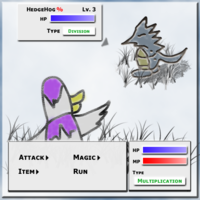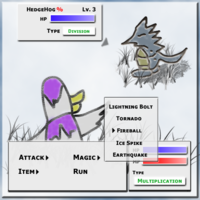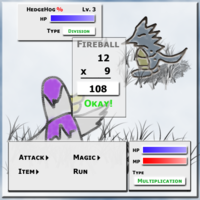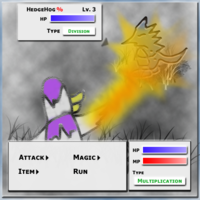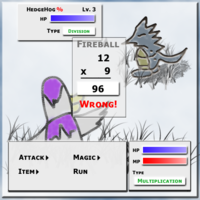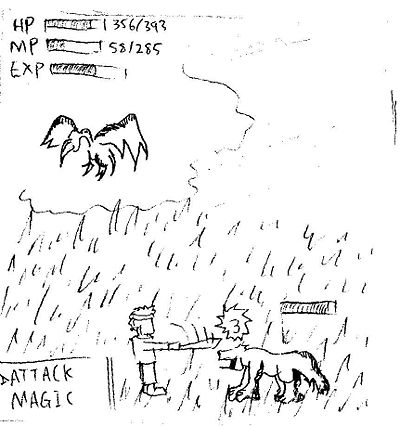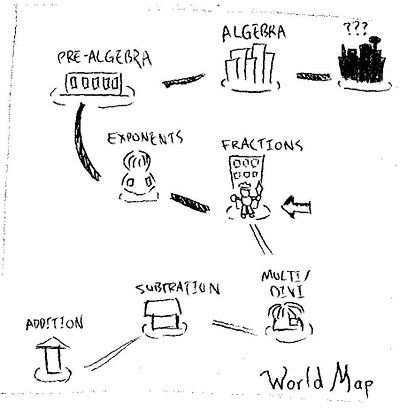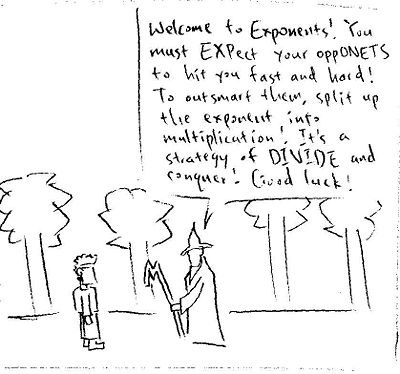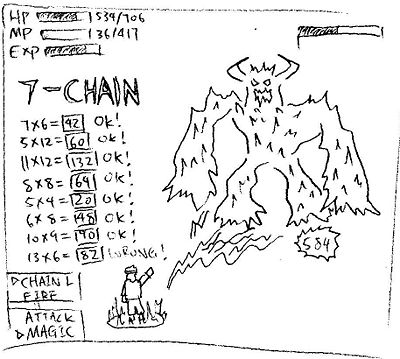Group Brainstorm-Group:BuTtErFlY
From CS 160 Fall 2008
Contents |
Group Members
- Mohammed Ali [ Individual Proposal ]
- Jordan Berk [ Individual Proposal ]
- Hao Luo [ Individual Proposal ]
- Gary Wu [ Individual Proposal ]
- Mike Kendall [ Individual Proposal ]
Math Learning Idea List
Given who was in our group, it seemed obvious that we were going to be prototyping a math RPG, but since the problem statement was about teaching math to children, we did some brainstorming around math games generally:
- Math RPG
- Sports based game: football/soccer
- Finance based: doing taxes/buying lemonade
- Simulation: real-life examples: stocks/economy based
- Mini-game based: mario-party
- Story-based game: Donald Duck in Mathemagicland game
- Collecting based game: mathemon .. collect-em all!
- Adventure game
- Action game: shoot-em ups
- Open-ended career choosing game
- Math and Bingo hybrid
- Math platformer: MathBlaster
- Board game based game: Candy Land/Chutes and Ladders
- Memorization games
- Card matching games
- Relationship game: harvest moon style courting
Math RPG Ideas
And the following list is from the brainstorm after assuming that we would be making a math RPG, figuring out the specifics of the game:
- mathemon (math & pokemon) (multiplication is super effective against addition)
- faster you answer, more damage
- chain math questions together for bigger attacks
- grinding (normal battles have math, bosses no) as incentive
- vs #4, boss battles have an input box rather than multi choice
- dungeons specific to question type
- dungeons specific to items
- ties between math and item/attack type (math elements)
- an uncomfortable amount of math puns
- normal attacks are straight rpg, magic/strong attacks are problems
- click to get around, easier in browser
- numpad on screen to type in answer, everything with mouse?
- vs 12: or textbox? BOTH?!?!
- chrono trigger encounter style
- math related puzzles (of course)
- myst like puzzles
- free form? click anything in the room and you can fight it
- use an rpg maker? hells yeah
- donald duck in mathemagic land THE RPG
- story driven
- pokemon simple attacks, each attack has to be a different math problem type?
- zoom in for battles to make it seem like we're not wasting screen real estate
- click to go to a square, also click to interact with an element
- math based minigames (bang bang, fishing, football)
- from 10: if monsters are immune to certain attacks, they must use magic
- from 25: have an animation that works as the timer for attacks to
- solve math problem
- atb and math? incorporate them?
- is there an atb?
- calculus type stuff is harder to randomly generate questions
- from 11: many enemies in room, click to fight each one (one at a time)
- comedy relief helper character that teaches concepts
- vs. 31, learn math from npcs
- from 1: animations including the math
- have you calculate your own exp for a boost
- have equations for damage or attacks on the screen
- cute visual ways to evaluate math (a double minus turns into a plus)
- "catch" attacks or earn attacks through the game... construct the
- gme so that you have to go out of your way to get attacks because you
- can't defeat division without multiplication
- speed up times for important battles
- save the princess
- allow the player to fight any boss from the get go if they know the topics
- use exp to buy things?
- math test to "hack" a store to make things cheaper
- consider the worth of magic points. how common should ethers be?
- save points? how will this affect younger players?
- when you run out of magic points, solve a problem to get your magic points back
- from 44: make it easy to replenish magic, make magic very strong
- somehow earn a way to not do math for one battle or a timed period, maybe by doign a harder problem, because we worry that math will get boring
- from 46: some non-math puzzles or mini games as a break from math
- from 46: add an element to your normal attack to avoid doing math problems
- the player can earn not doing problems when he proves to the game that he knows a certain problem type
- have "active attacks" out of the total attacks that you know
- ^ is better than * is better than +
- there should be older problems in a dungeon
- enemies embody problems that are solved by what they're weak to (sharing the m&ms monster is weak to division)
- should there be a times table on the battle screen?
- harvest moon style courting, with MATH
Target User Group
The target user group would students from later elementary school to high school. The game would target those students who have trouble understanding mathematical utility in everyday life.
Problem Description
Students often lack the motivation of learning math. They often shy away from learning math because they simply find it to be useless in everyday life. The problem case here is to provide a means to help students understand how and when math skills can be useful to everyday situations.
Problem Context and Forces
The level of mathematical ability in high school graduates are seeming to decline in the US. This can be traced to the lack of motivation for US students to use math in their particular choice of careers and their personal lives. Math is important in many professions from business to engineering. People who are well versed in math can learn to make important decisions in life and everyday activities including, shopping wisely, making financial decisions and budgeting. There are a large amount of math games out there to help students with a particular skill in math. However, those games still lack that motivational drive that students need to make the effort to learn that particular skill. Games used to increase mathematical motivation is not so popular.
Why A Serious Game?
A game is a perfect way to get kids to learn and practice math. Doing repetive written math problems may seem boring to a student who is not math-inclined or interested. A game, on the other hand, can immerse the child in the world it provides. The math presented in the Math RPG game directly affects the player's success. By setting it up like this, the math problems no longer seem like a chore, but instead are representative of in-game events such as defeating enemies, leveling up, and moving to the next location/quest/etc. Correctly answering a math question always results in a direct and obvious reward, which has the potential to make math fun.
- Image courtesy of Warner Bros.
Solution Sketch
What we need is an educational game that makes the chore of doing problem sets fun and addictive. The solution is to model it after an RPG (role-playing game). In such games, the player takes on a character who battles enemies, gains experience, and grows stronger as the game progresses. Such games also usually include a deep story which allows the player to grow attached to his character in the game, allowing for a more rewarding experience when the player levels up his character and watch it grow stronger. In fact, a popular term used to describe leveling up characters in such games is "grinding." The word itself implies that leveling up is a chore and it is repetitive, yet it can also be highly addictive because leveling up provides the player with a rewarding experience and also allows the player to progress further in the game. This is the exact solution we need to solve our problem.
To implement this well we need to understand the appeal behind grinding and why players do it. Usually they meet an obstacle in the game (usually a boss character) which they are not strong enough to bypass, and they must resort to grinding to get stronger. The motivation comes in the rewarding feeling of eventually defeating the boss after leveling your character. As such, the boss fights should be fun, and not involve solving math problems. They are the reward for grinding; they cannot be grinding itself. In order to defeat boss characters, the player must journey through dungeons with monsters that they battle by solving math problems. Each dungeon can have its own theme, which corresponds to a particular topic in math.
Another important element of RPGs is weapons and armor. Getting better weapons and armor is akin to leveling up but involving actual objects. There is a great amount of appeal, especially within the hardcore gaming community, to obtain the best weapon and armor in the game, despite what tedious chores the player needs to go through to obtain them. We can use this to our advantage. For example, hide weapons and armors in treasure chests, which can only be opened by solving a math problem. The better the weapon, the harder the problem.
This RPG is a little different because it will incorporate a math theme and other math logic. For example, there could be math elements, so that if you cast a addition spell, it will deal addition damage. Or maybe you can have a puzzle in which math is important to solving it. Maybe in order to have stronger attacks, you will have to solve a simple math problem very quickly. These ideas were discussed in our math RPG brainstorm, and it seems that this is where our game is heading: answering math problems in the middle of battle will make your attacks stronger.
- Mathemon Concept Sketch and Other Concept Sketches of Possible Game Elements

